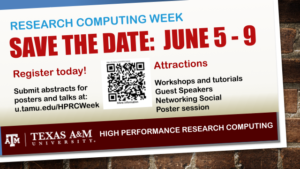
Call for Participation: Texas A&M Research Computing Week – June 5-9, 2017
Conference web site: http://u.tamu.edu/HPRCWeek
Register your interest and submit talk and poster abstracts here!
Texas A&M High Performance Research Computing is hosting a week-long series of events June 5-9, 2017 to introduce the A&M research community to computing and data resources and expertise available to support research, and, for advanced users, to provide additional training.
The week will start with morning and afternoon workshops on a variety of topics on using local and national research computing resources, and will end with a Symposium on Thursday and Friday presenting talks and posters about best practices in computing and data intensive research, and national perspectives on building cyberinfrastructure capacity in the U.S. A Reception and Poster Session are planned for late Thursday afternoon.
Please help us refine the program by registering your interest in participating in Research Computing Week events and by indicating what topics you would find most interesting. If you would like to present a short (~20 minute) research talk or poster about how you use computing in your research please provide a title and short abstract on the registration form.
The preliminary deadline for submissions is May 5, 2017 so please respond as soon as possible. As the program develops we will keep you informed.
For further information about Research Computing Week and opportunities for sponsorship send email to mcmullen (at) tamu.edu or call 979-458-8414.
